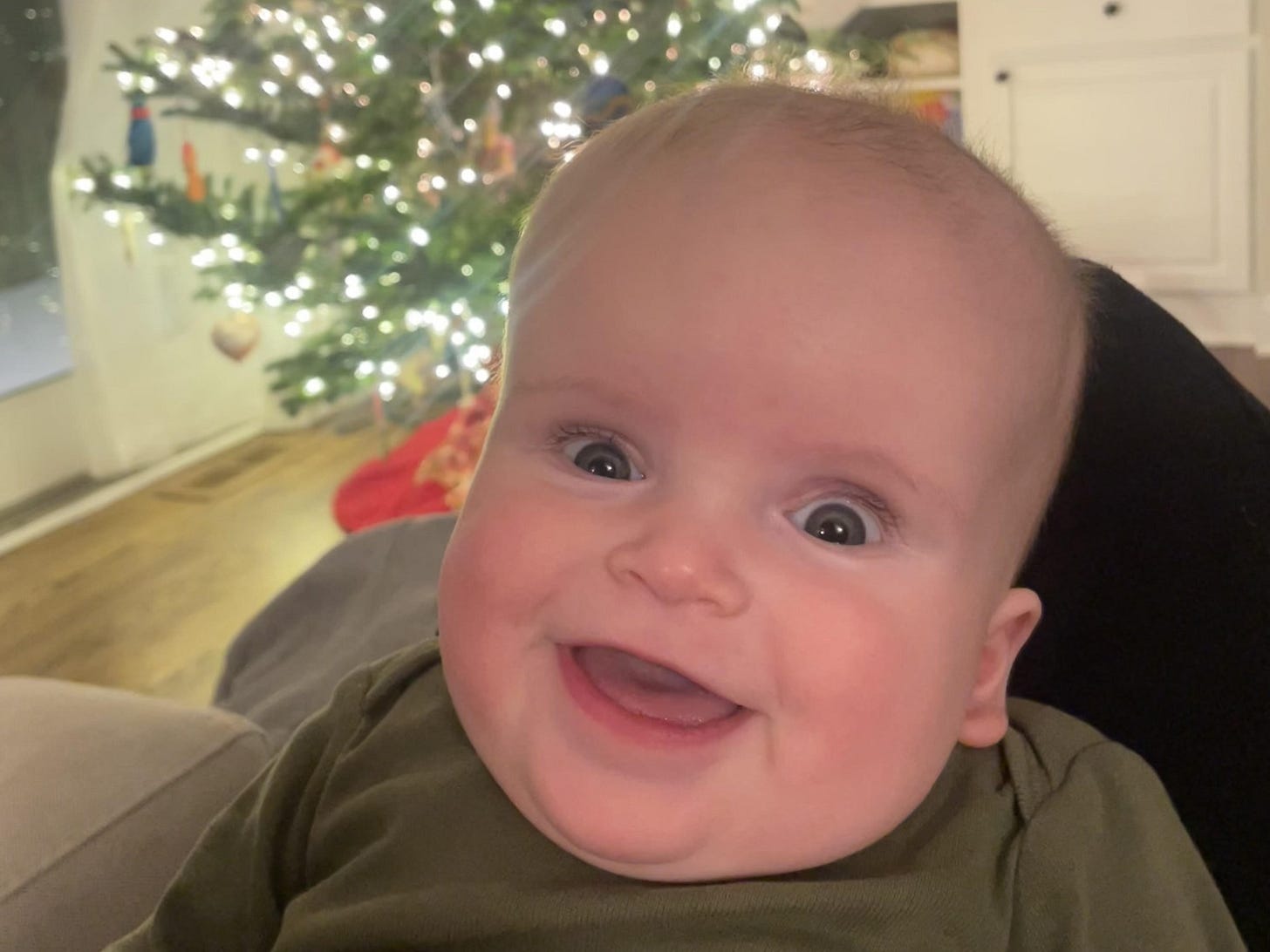1. Brain Surgery
This Thursday morning, a pediatric neurosurgeon will operate on my son Dominic. He’s just shy of six months old, and this will be his third surgery—but this will be the first one on his brain.
Dominic has spina bifida, a birth defect affecting the formation of his spinal cord. This condition and outcomes for those who have it vary widely. At the most minor end of the spectrum, some people can actually have spina bifida and not even know it until they have a spinal X-ray later in life for some other reason. In severe cases, people have virtually no mobility and a host of other issues.
From my understanding (learn a lot more here), the severity of spina bifida depends largely on the nature and location of the neural tube defect. If it’s rather low—for example, in the sacral region of the spine—then, outcomes are generally more mild in nature and might include walking with crutches or even unassisted. As the location moves up the spine, the severity generally increases.
Dominic’s spinal cord protruded from his spine around the top of the lumbar region (he’s an L1 myelomeningocele in spina bifida speak). Eleven hours after birth, he underwent about four hours of surgery to close the opening in his back. That’s necessary to prevent infection, but it doesn’t do anything to extend the nerves further down the spine from where they end.
We’ve seen no evidence that Dominic has any sensation from the waist down. He also has a few other issues involving his kidneys that we’re monitoring, a clubfoot that’s being addressed, and a structural defect in his brain known as a Chiari II malformation.
It’s very common for people with spina bifida to experience hydrocephalus, which is a buildup of cerebrospinal fluid in the brain. Over time, that fluid can create excess pressure that affects cognitive function and development. One way to deal with that is to relieve the pressure via a shunt, which is a device implanted in the brain and connected to tube that runs under the skin all the way to the abdominal cavity.
That’s what Dominic will get on Thursday, under the hands of the same pediatric neurosurgeon who operated on him shortly after birth. It’s not an unusual procedure, and it’s something we knew was a highly probable necessity.
But it’s still brain surgery. On a baby.
2. Surrender
When faced with uncontrollable events and situations in life, we have a variety of ways in which we may respond. We may react with denial, disbelief, or shock. We may rage against the sky at the unfairness of it all, wondering why the universe or God is punishing us. I’ve done all of those at various times.
We may also accept the realities of our situations while persisting forward with a deep sense of hope in the outcome—for ourselves here on earth (or beyond), for those whom we care about, and for those who will come after us. That can be a tough pill to swallow and it may take time to get there, but I have found no productive way to deal with the suffering of life except through finding meaning and purpose in the suffering itself.
We do have that choice.
Unfortunately, the trials of life—particularly when repeated and coming from circumstances beyond our control—can leave us feeling helpless. And that’s completely understandable. After all, there are many parts of life that we cannot help, over which we indeed have no power.
But this can become highly problematic when we start to treat everything as beyond our control. This is a condition that’s been called “learned helplessness,” and it can be an understandable reaction in the midst of trauma or a variety of other sorts of hardship. We experience one thing that sets us back, then another, then another—until we just throw our hands up and quit trying. Again, I get it.
Yet the antidote to learned helplessness seems to be learned control. This involves recognizing and acting upon that which we can influence. That might include small actions for ourselves or others. At its core, however, it involves how we think and how we psychologically (and spiritually, I’d argue) frame what we face. Regardless of what happens to us, we always have the power to choose how we think about it and how we respond within our own minds.
I also find utility in trying to separate that which I can control from that which I cannot. This is certainly not an original concept of mine, but it’s worth repeating and remembering.
I think about it in terms of surrender.
Those aspects of what I face that are beyond my control are the ones that I try my best to surrender, relinquishing them to forces beyond me. As a person of faith, those forces include divine providence, which in turn governs a number of other elements beyond my control—including the hands of Dominic’s neurosurgeon and the expertise of other medical professionals.
At the same time, I try my best to remember what still is within my control—including the very choice itself to surrender.

3. Radiance
Finding purpose and meaning in the suffering of one’s child—of any child—is no small task. Dominic will certainly face a variety of challenges for his entire life, and my wife and I will be alongside him with those challenges for the rest of our lives too. We’ll be solidly in our 60s when he turns 18, so our “golden years” will look different from those of our peers. Many tough moments are ahead.
And yet I can clearly see a future full of light, glimmers of the sacred that will undoubtedly shine through Dominic’s life and elevate us all in countless ways.
Because of him, my other children will get to learn what it’s like to be around and to support a sibling with special needs. They already are.
Because of him, my wife and I will continue to grow in our compassion and recognition of the value of every human life. We already have.
Because of him, I have the opportunity to become more patient and more selfless. The crucible in which he and the rest of our family are embarking has the opportunity to make all of us better people, to sanctify us in little ways every day. One might even say that is itself a gift.
Why am I confident about the radiance that will emerge from Dominic’s life? Because it happened with my other son Vincent, who died in a tragic accident about four years ago when he was seven years old.
Vincent’s death was an unquestionably profound and tragic loss. And it remains so. I think about him multiple times every day, and if I could bring him back, I’d do it in a heartbeat.
It’s weird and it’s painful to acknowledge and it in no way minimizes the loss, but it’s also undeniable that the magnitude of love in the world literally increased after Vinny died. The outpouring of kindness and mercy we received from our community since then continues to inspire us, and literally thousands of people have benefited from the day of service we facilitate each year in his memory. And I’d like to think that I’ve become a bit more thoughtful, more understanding, and wiser too.
Dominic’s surgery this week will coincide with what would have been Vincent’s twelfth birthday. For me, it’s another reminder that it is indeed possible for there to be radiance amid our trials—if we look in the right places, if we orient our lives in the right direction, and if we think keenly about what really matters.






We’ll be praying for Dominic, the team of surgeons, you and Lindsay and your family. God bless the Baran family.
Fondly, Linda & Marty Kardish
This song may speak to you https://www.youtube.com/watch?v=qyiO4ZuAiZc
Every good wish.